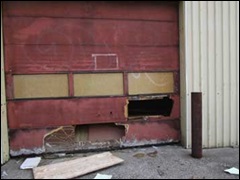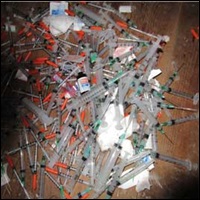The following is a guest blog post by Monica Migliorino Miller, Ph.D., director of Citizens for a Pro-Life Society and author of Abandoned: The Untold Story of the Abortion Wars (St. Benedict Press, 2012).

This story begins on Sunday, March 15, 2015 when pro-life activist leader Pro-Life Detroit’s Lynn Mills happened to be driving near Flint. Under what can only be described as an inspiration from God, she decided to take a look at vacant abortion center formerly owned by retired abortionist Alberto Hodari.
After parking her car in the empty lot in front of the building (where the entrances were boarded up), she walked to the left side of the run-down structure and saw that a large opening had been cut in the chain link fence which already posed a security breach to the facility.
Walking right though the large hole, Lynn notice a side door. She decided to tug on its handle and the door did something she never expected—it instantly opened! To her shock, Lynn was immediately confronted by stacks upon stacks of boxes that appeared to contain files of Hodari’s patient records. Many of the boxes were marked with the words “charts” and “records”:
Several boxes, completely visible through the door, were marked on the outside with the names of the locations of Hodari’s five former Michigan abortion clinics: the abbreviation “SFLD,” meaning his Lathrup Village clinic on Southfield Road, “Lansing,” “Macomb” (for his Sterling Heights clinic), “Downriver” (for his Southgate clinic), and “Livonia.” Manila folders were plainly visible though small slots in the boxes and appeared to be stored alphabetically as many boxes recorded a beginning and ending last name.
That same afternoon Lynn called me and asked me to go back with her to the clinic to investigate the situation further. When we arrived it was nearly nightfall. Lynn tugged again on the handle of the same side door. This time, however, it was mysteriously locked.
We thought it had just been an unexplained fluke as to why this door that led to the back of the old abortion center had not been locked earlier that day but was certainly locked now. The records containing sensitive information about women who had had abortions appeared to be secure—that was, until we walked around the back of the building.

Perhaps I do not have to impress on the reader the enormity of this situation both morally and legally. Lynn and I discovered the documents of death—the documents of a notorious abortion practitioner who piled up stacks of private medical records in a building that was neglected, falling apart and, left unmonitored for vandalism and vagrancy—a completely open building where medical records of women who had had abortions were vulnerable, subject to possible theft and violation of confidentiality, contrary to Michigan State law on the proper retention of medical records.

Lynn and I immediately went to the Flint Police Department that Sunday night only to be told that there was no squad available to send out to the clinic and that we should file a police report on the department’s website.
We decided that perhaps the Genesee County Sheriff’s Department would initiate an investigation and traveled back to Flint and spoke to a kindly deputy the next day but he seemed confused as to whether his department had jurisdiction over the problem, so he bounced us back to the Flint police, who told us to talk to the Genesee County prosecutor’s office, who told us to go back and get the Flint police to take a report.
In the meantime we went back to Feminine Health Care to meet with a Flint Journal reporter. Before the reporter arrived, Lynn and I wanted to see if the hole in the garage door was perhaps now boarded up. It wasn’t. However Lynn looked though the large portal and to her amazement saw that all of the boxes of records were gone—they had been removed!

Why was the mountain of medical records gone now? Lynn found out that indeed Hodari had just sold the building for a paltry $25,000 and the new owners required that no fewer than 573 boxes (of records) be removed. And get this: the new owner may be a pastor looking to use the building for a church.
Can you imagine using a place where thousands of innocent people were put to death as a location for worship? If this turns out to be true we will ask the congregation if they will erect a plaque or monument on the property for all to see so that what happened to the unborn who perished there will not be forgotten.
Lynn and I filed a report with the Flint Police and we will follow up to see what action, if any, will be taken. We also plan to take our documented evidence to the Michigan Attorney General and urge that Hodari be held responsible for dereliction in his responsibility to ensure the security of the medical records from his practice of abortion.
Michigan State Law (333.16213 and 333.20175) governs the proper retention of medical records and states:
Records shall be maintained in such a manner to ensure their confidentiality and proper use and to ensure their accessibility and availability to each patient or his or her authorized representative.
Michigan Public Health Code 333.13811 governs the proper disposal of medical waste including medical sharps.
About the experience, Lynn Mills says this:
When the door opened, I had the wind knocked out of me with what was before my eyes, and I remained breathless for days at this sight and the though of it. I shouldn’t have been shocked and surprised at anything the abortion industry does. Yet this is right up there as one of my most disturbing discoveries. The boxes spoke volumes at the magnitude and reach Hodari and his contract abortionist had to moms, dads and their babies.
For over two years now I’ve been trying to assist the State of Michigan with my investigative work regarding the abortionists and all that they touch. There is an active allegation being investigated by the state because of my reporting and research. I [didn’t] realize what [lay] before me when I saw those boxes. I now know where Hodari put all of his medical files when he told the State his address of record was Livonia.
My associates in investigations and I have been attempting to get the State to have the abortionists comply and be accountable for their patients/victims. In the last five years twelve abortion mills have closed in Michigan and every time one closes we seek public information from the State as to where the patient files and the left-over clinic drugs are stored. And every time we get the same answer: “The doctors have a protocol to follow.” Obviously Hodari did not follow that protocol.
I must add my gratitude to Monica for responding to my call. Not only did God lead me there, he told me it was too big for me alone. And a thank you to Judy Climer, president of Flint Right to Life for her guidance through Flint and Genesee County politics.
A Unique and Bizarre Pro-life Experience
I have to say that this whole episode has been one of the most unique, even bizarre experiences that I have had as the director of Citizens for a Pro-Life Society, and that’s saying a lot!
I experienced a heavy sense of oppression being so close to the documents of death, being so close to this place of death and despair where certainly thousands of human beings were killed since the clinic’s opening in 1977. The silence, the shadows and the darkness seem to speak the sorrow of the place.
Now in disrepair, the fencing rusted, bent and sagging, the parking lot full of weeds, trash and debris—including, oddly, several frozen copies of the Encyclopedia Britannica piled up on the side of the building, a speed boat dumped in the back with scrub trees growing though its rotted floor, broken glass everywhere, broken furniture, broken ventilation and heating pipes dangling from the ceiling—and nowhere a window, not a single window in the whole dark place, as if no light could ever shine in a structure put to the service of lies and death.

On a wall in the large back room we saw two words spray painted in graffiti: “HELP ME.” And so the silent canvas of this abandoned abortion clinic speaks the cry of the unwanted unborn, the women speak their desperation, and maybe even Hodari beckons to a Savior he cannot name.
May redemption be his before passing from this world: “Help Me.”
Related
- Channel 12 ABC News (Flint) video and story: Medical records abandoned at former Flint abortion clinic
- One of the major fruits of this discovery are the hundreds of Facebook comments on the Channel 12 News Story, many of them from women who had abortions at the Flint clinic
